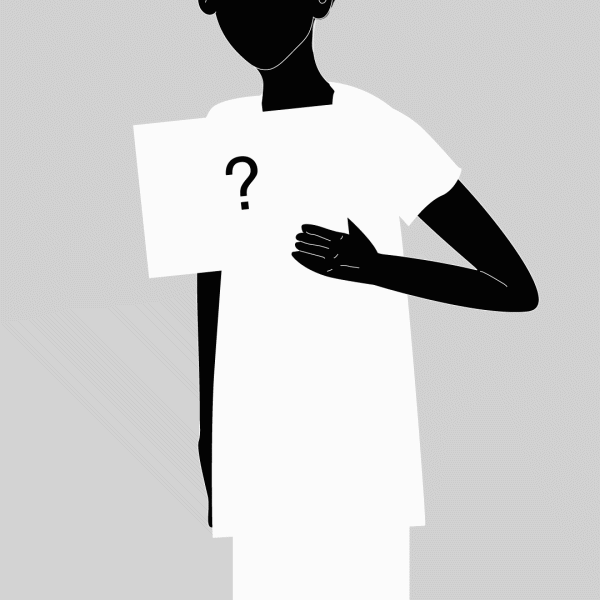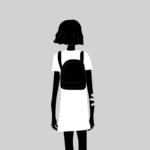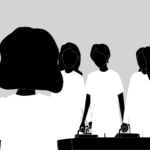GENDER NEUTRAL PRONOUNS

While talking about a friend in Albanian I came across many gendered terms that would not work for either me or them. Every adjective I needed to use to describe them was gendered because every adjective in Albanian is gendered and the pronoun ‘they’ has no gender-neutral form. This is a problem that is faced by every Albanian-speaking person who uses they/them pronouns or gender-neutral terms. Many genderqueer people have resolved to either use pronouns, adjectives, or terms they are not comfortable with because of the lack of inclusivity in the Albanian language grammar or creating new pronouns to fit their gender identity or gender expression.
Non-binary is an umbrella term for any person who does not identify as female or male, only. There are different identities under the non-binary umbrella, including agender, genderfluid, genderqueer, bigender, etc. and typically, non-binary individuals do not identify with the gender they are assigned at birth, therefore, it is under the transgender umbrella.
In their article titled “10 ways to become a better ally for non-binary people”, when writing about respecting non-binary identities, Dylberizmi explains “don’t refer to a group of people with “ladies and gentlemen”, “boys and girls”, or “the boy/girl in red”. You can use expressions such as “people” “persons” or “person in red”.” Further, they add “words in albanian are very gendered, that is why it is best to ask people what language to use when talking to them. It is best to ask “What pronouns can I refer to you?” then to assume their gender.” (2020)
Most used English pronouns among nonbinary people are they/them pronouns and there is no gender-neutral translation of them in Albanian. The nonbinary community is currently searching for pronouns and terms they can use to feel comfortable in Albanian speaking environments. All of my friends have settled with changing from Albanian to English when using they/them pronouns due to the lack of inclusive language in Albanian. I have started using Aj/Ate/Atyre pronouns, however, many NB people are not comfortable using ‘Aj’ since in Gheg dialogue it is phonetically the same as ‘Ai’ which translates to ‘he’.
Eri, an individual who uses they/them pronouns in English but he/she pronouns in Albanian said “The lack of gender-neutral terms in our language is something that throws you in an uncomfortable loop of misgendering yourself and constantly having to measure on which side of the spectrum you fall in which I find unhealthy.”
Further, Veri, scepticalbutch on instagram, an individual who uses they/them pronouns in English and she/her pronouns in Albanian said “While I do use the pronouns they/them in the English language, I am still struggling to find gender-neutral pronouns to use in Albanian and German because they have the same issue: they are extremely gendered in a binary way.
In German the non-binary community has proposed to use dey/deren, ‚dey‘ being a reference to they and ‚deren‘ being the german translation of their, it is not yet officially recognized though.”
Furthermore, Veri created the chart below stating “since the nominative pronouns end with ‚i‘ (ai) and ‚o’ (ajo) i feel like we should create gender-neutral pronouns that could end with the rest of the vowels like ‚a‘, ‚e‘ or ‚u.‘ We could also keep the neutral pronouns in singular instead of making them plural. we could also use ‚x‘, ‚y‘ or ‚z‘ when creating since those letters are often used to create neopronouns.”
Examples:
masculine: Ai shkon në shkollë.
feminine: Ajo shkon në shkollë.
neutr. version 1: Aje shkon në shkollë.
neutr. version 2: Ajy shkon në shkollë.
masculine: Telefoni i përket atij.
feminine: Telefoni i përket asaj.
neutr. version 1: Telefoni i përket adej.
neutr. version 2: Telefoni i përket adyj.
In conclusion, gender-neutral pronouns are the first steps to a more inclusive society where nonbinary people and people who use they/them pronouns don’t have to misgender themselves because of a language that was designed around two genders. Also, they are the first steps because the Albanian language, and a lot of other languages, need more gender-neutral words. I want my nephew to have a way to refer to me that is not ‘aunt’ or ‘uncle’ and I want to have a word for my sibling’s kid in case he tells me he’s not comfortable with gendered terms. I want to talk about my nonbinary friends without having to switch from Albanian to English, and I want to show Albanian-speaking people that using gender-neutral pronouns is normal.
I am writing this in hopes that other people get inspired to write their own points of view, share ideas for gender-neutral pronouns and terms, and help our community so we don’t have to resort to misgendering ourselves anymore.
About the author: Ern is 23 years old from Kaçanik, is a non-binary writer, he graduated in English Language and Literature
This grant is supported by the Balkan Trust for Democracy, a project of the German Marshall Fund of the United States


